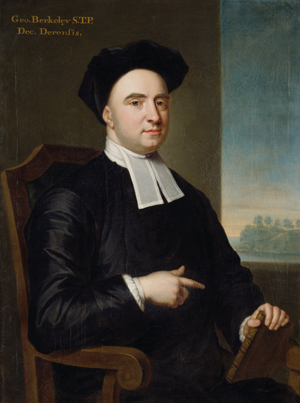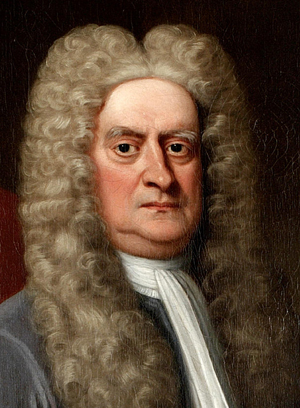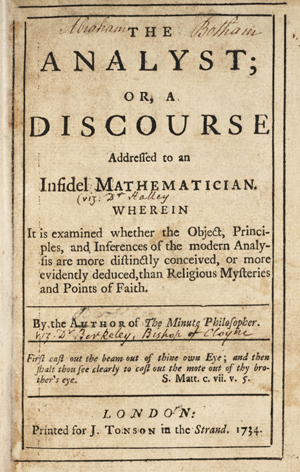Berkeley vs Walton
Published in Features, Issue 4 (July/August 2019), Volume 27A master-class in trolling from an eighteenth-century bishop.
By Clare Moriarty

Above: Bishop George Berkeley—a quintessential troll?
George Berkeley is Ireland’s best-known historical philosopher, whose fame rests on being the chief advocate of a pretty peculiar metaphysical position: immaterialism, the view that no mind-independent material objects exist. Historians of mathematics know him as a petulant critic of early calculus. In his more mean-spirited epistolary moments, he was a quintessential troll.
Trolling
For those less thoroughly familiar with the interactive parts of the internet, ‘trolling’ is a kind of online provocation in which a person posts content with the intention of sowing a kind of discordant confusion or upset. It often takes the form of insincere but persistent commenting and pestering, wildly unfair interpretations of another’s views, or tedious nit-picking and derailing. It results in a negative but also strangely jubilant kind of exchange. For the trolled, it’s frustrating, intimidating and infuriating. For the troll(er) and his/her allies, it’s often hilarious.
One form of trolling involves the wilful interpretation of another’s sincere output as insincere: a kind of ‘wink-wink-nudge-nudge’ indicating that the troll ‘knows’ the ‘true’ (read: likely opposite) intentions of the commenter. Consequently, the troll attributes sarcasm or insincerity where there really is none. After all, what could be more frustrating than to have your sincerely and passionately held views remarketed as sarcastic by your ideological enemies? The Twitter account ‘Close But No Potato’, which describes its remit as ‘dipsh*ts on the verge of a breakthrough’, deploys a similar strategy. It takes sarcastic right-wing tweets expressing what the original poster takes to be a ludicrous scenario (paraphrasing one exchange: ‘How about we just get rid of all prisons then?!’) and retweets it from their satirical account in hopes of showing that their target’s sarcastic or hyperbolic version of a hell-scape is pretty close to what the left think is sensible (‘Yes please!’). Trolling is bad internet behaviour but, as with so much misconduct, it can be utilised to dramatic effect in the pursuit of an agenda and, as such, the moral status of the trolling can be thought to correspond to the moral status of the ideology it supports.
Unlikely as it may seem, the ‘Good Bishop’ (as Bishop Berkeley is often called) was something of a pioneer of the kind of trolling behaviour described above and was extremely skilled in deploying it to demoralise and infuriate his opponents. Thus the trolling honours list that contains satirists like Jonathan Swift and Alexander Pope (both personal friends of Berkeley’s), and finds serialised brilliance in Flann O’Brien’s ‘Cruiskeen Lawn’ efforts, should also make space for Bishop George Berkeley.
The analyst

Above: Isaac Newton—the irreverence of Berkeley’s critique upset a community of British and Irish mathematicians, including J. Walton, who were deeply loyal to Newton.
A pre-eminent example of Berkeley’s trolling of mathematicians takes us to the year 1735. The year before, Berkeley had published The analyst; or, a discourse addressed to an infidel mathematician, a famous critique of Isaac Newton’s calculus (then called ‘the Doctrine of Fluxions’). He criticised the theory’s logical coherence under the hyper-strict rational standards that mathematics advertised for itself. Berkeley, who had taken umbrage at criticisms of religion that compared it to mathematics and found it wanting, sought to exploit the failure of the new celebrated calculus to meet these logical standards in order to discredit those very standards. After all, if even contemporary mathematics’ greatest achievement was purportedly failing this logical respectability exam, then it was very unfair to deem religion irrational on the basis of its poor performance.
Berkeley is obstinate and sarcastic in his handling of these topics; he identifies fluxions with ‘the velocities of evanescent Increments’ and derides the latter as ‘the ghosts of departed quantities’. This irreverence upset a community of British and Irish mathematicians who were deeply loyal to Newton. Further, cronyism was running high in European mathematics; the previous years had witnessed a fraught turf war between British and Continental mathematicians over who had the rightful claim to have invented or discovered calculus—Newton or the German polymath Gottfried Leibniz.
Berkeley’s semi-mocking criticism of calculus received impassioned responses from numerous figures. One reply came from the celebrated Scottish mathematician Colin Maclaurin in 1742. It was a 763-page defence and improvement of Newton’s methods presented in direct response to Berkeley’s criticism of Newton’s work, and, in Maclaurin’s words, on the basis that ‘their having been so much misunderstood by a person of his abilities [Berkeley], appeared to [Maclaurin] a sufficient proof that a fuller Account of the Grounds of them was requisite’. The other two responses of note were more immediate and came from ardent defenders of Newton’s mathematics and character: Cambridge mathematician James Jurin and Dublin mathematician J. Walton. The opening lines of Berkeley’s response to James Jurin’s defensive offering gives a flavour of the tone of things to come:
‘When I read your Defence of the British Mathematicians, I could not Sir, but admire your Courage in asserting with such undoubting Assurance things so easily disproved’
(A defence of free-thinking in mathematics).
Reasons for not replying to Mr Walton’s full answer
The response to Walton, however, is where we find Berkeley at his most truly troll-like. Little is known about the personality (or, indeed, first name) of J. Walton, but for context it is worth noting that Walton’s initial response to Berkeley was also a little feisty in places. Walton criticises Berkeley’s ‘magisterial assertions’ in ‘his unjust and shameful Treatment of Sir Isaac Newton’. Walton also repeatedly asks how ‘DARE’ (that’s right, Caps Lock on!) Berkeley allege such and such of Newton when Newton has said otherwise elsewhere. And he is generally pretty negative about Berkeley’s scientific aptitude, to judge from the following:

Above: The analyst; or, a discourse addressed to an infidel mathematician—Berkeley’s famous critique of Isaac Newton’s calculus.
‘I do not wonder that this Author shou’d have no clear Ideas or Conceptions of second, third or fourth Fluxions, when he has no clear Conceptions of the common Principles of Motion …’.
So Berkeley was responding to some animosity, too. He opens his response to Walton with an accusation of rambling:
‘There are some Men that can neither give nor take an Answer, but writing merely for the sake of writing multiply words to no purpose’.
Uncharitable, certainly, but the real trolling begins when Berkeley professes his true reason for discontinuing this debate with Walton:
‘The true reason is, that he seems at bottom a facetious man, who under the colour of an opponent writes on my side of the Question, and really believes no more than I do of Sir Isaac Newton’s Doctrine about Fluxions, which he exposes, contradicts, and confutes with great skill and humour, under the masque of a grave vindication’.
This tract from Berkeley is called Reasons for not replying to Mr Walton’s full answer, and one of his purported reasons for not replying becomes clear at the outset: Berkeley claims to have realised that Walton is only pretending in his impassioned defence of Newton’s fluxions and is really as committed to discrediting the logical reputation of calculus as he is, and, further, is an agent secretly working to publicly humiliate Newton. Berkeley explains that his revelation as to Walton’s true purpose followed a brief phase of simply thinking that he was dealing with an incompetent arguer. He ‘realises’, however, that a man cannot argue so badly in favour of a thing he truly understands unless sabotage is his true purpose.
‘But, be a man’s Assertions ever so strong in favour of a Doctrine, yet if his Reasonings are directly levelled against it, whatever Question there may be about the matter in Dispute, there can be none about the Intention of the Writer’.
What follows are fairly systematic responses to the arguments offered by Walton in his critique of Berkeley. Alongside these mathematical and metaphysical arguments, however, there is a constant peppering of the ‘I-know-what-you’re-really-up-to’ intentions—trolling. The product is a strange mixture of arguments about bodies in motion and the coherence of higher-order fluxions, all amidst constant cautions to the reader that Walton is performing some sort of guilty-by-association smear against Newton. Berkeley continues to suggest that the reader remember that Walton is really on his side of the debate:
‘Should a Person, so knowing and discreet as Mr Walton, thwart and contradict Sir Isaac Newton under pretence of defending his Fluxions, and should he at every turn say such uncouth things of these same Fluxions, and place them in such odd lights, as must set all men in their Wits against them, could I hope for a better second in this Cause?’
And, Berkeley muses, what better way to decry Newtonian mathematics than to bumble public defences of it? With friends like that, who needs enemies? Walton, Berkeley claims, is taking this technique to new levels in his ‘defences’ of Newton’s method:
‘Mr Walton indeed after his free manner calls my Analyst a Libel … But this ingenious Gentleman well knows a bad Vindication is the bitterest Libel … To utter Contradictions and Paradoxes without Remorse, and to be at no pains about reconciling or explaining them? And with great good humour to be at perpetual variance with yourself and the Author you pretend to vindicate? How successfully Mr Walton hath practiced these Arts, and how much to the honour of the great Client he would seem to take under his protection, I shall particularly examine throughout every Article of his full Answer.’
Much of the remaining mathematical argument takes place as a kind of hypothetical exercise whereby Berkeley claims to be responding to Walton’s arguments as though they actually had been sincere rather than simply the tactics of some wily Newtonian nemesis.
‘Who but Mr Walton could have inferred them? Or how could even he have inferred them, had it not been in jest? … he takes occasion, as hath been observed, to explode Sir Isaac’s own Doctrine, which is utterly inconsistent with Mr Walton’s. And can you now doubt the real design of this egregious Vindicator?’
Berkeley closes by reminding the reader that Walton’s true contribution is tantamount to an admission of defeat on Newton’s behalf, and by musing that someone, someday, might actually write a serious objection to their shared anti-calculus position.
‘To conclude, I accept this Professor’s Recantation, nor am at all displeased at the ingenious method he takes to disguise it. Some zealous Fluxionist may perhaps answer him.’
To understand how infuriating this must have been, we have to imagine stepping out into the world of letters in impassioned defence of our intellectual idol and being formally responded to as variously a buffoon, an imposter and a saboteur. Earlier, I ventured that the moral merit of an act of trolling has to rise or fall with the merit of the position defended, and so I leave it to the reader to decide whether the defence of faith-centred and miraculous religion merits such rhetorical savagery!
Clare Moriarty lectures in philosophy in University College Dublin.
FURTHER READING
G. Berkeley, ‘Reasons for not replying to Mr Walton’s full answer’, in The works of George Berkeley IV (London, 1948–57).
R.A. Hall, Philosophers at war: the quarrel between Newton and Leibniz (Cambridge, 1980).
J. Walton, A vindication of Sir Isaac Newton’s Principles of Fluxions, against the objections contained in the Analyst (Dublin, 1735).
















